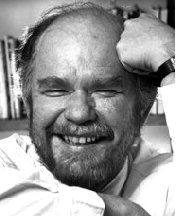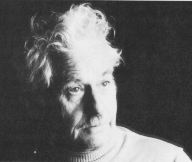Canadian Theatre Encyclopedia
Mitchell, Betty
Producer, director, and teacher Betty Mitchell was active in establishing and encouraging amateur theatre in Calgary. She was born in Ohio in 1896 and grew up in Saskatchewan, teaching in rural schools before studying botany at the University of Alberta. For ten years she taught biology in Calgary schools, and exercised her love of theatre in various amateur organizations – The Green Room Club from 1929 to 1930, the Calgary Little Theatre Association in 1932, the Calgary Theatre Guild in 1935-36, and the University Women’s Club in 1941, for which she directed Boy Meets Girl in 1941, with the proceeds going to the Queen’s Canadian Air Relief Fund.
She assumed the position of Director of Drama in Western Canada High School from 1936 to 1961, directing Our Town and As You Like It among many other plays. In 1942 she was awarded a Rockefeller Fellowship which enabled her to study and teach at the State University of Iowa, where she earned an MA in theatre. Upon returning to Calgary, she founded an amateur theatre company with her former students – Workshop 14, and from 1945 to 1968, she directed a wide range of plays, many of which won awards from the Alberta Drama Festival and the Dominion Drama Festival, including Hedda Gabler in 1949, The Rivals in 1950, The Giaconda Smile in 1951, The Apple Cart in 1955, and Anne of the Thousand Days in 1957, in which playwright Joanna McClelland Glass made her acting debut.
In 1966, Workshop 14 amalgamated with the Mac Theatre Society to form Calgary’s first professional theatre, Theatre Calgary.
Betty Mitchell also directed at the Studio Theatre at the University of Alberta in 1963, and adjudicated entries in the Dominion Drama Festival from 1955 to 1960. In 1955 she was awarded the Mayor’s Award for exceptional public service in the field of drama, and in 1958 she received an Honorary Degree from the University of Alberta for her achievements in amateur theatre. In her name, the annual Betty Mitchell Awards or "Bettys" were established in Calgary to celebrate productions of plays, acting, directing, and design. A small theatre in the Southern Alberta Jubilee Auditorium was also named after her. She died in 1976.
Further information: Ken Dyba. Betty Mitchell. Calgary: Detselig, 1986.
The Dr. Betty Mitchell Archives are located in the Glenbow Museum, Calgary: www.glenbow.org.
Betty Mitchell Awards website: www.bettymitchellawards.com
Profile by Anne Nothof, Athabasca University
Last updated 2022-07-27
Mitchell, Ken

Playwright, novelist, and poet, born in Moose Jaw, Saskatchewan, December 13, 1940.
Ken Mitchell studied journalism at Ryerson in Toronto, and graduated in 1967 from the University of Saskatchewan with an MA in English. During his university years he wrote articles for the Regina Leader-Post, short stories, and radio drama for the CBC.
In 1974 he wrote the epic play, The Medicine Line, about the exodus of 5,000 Hunkpapa Lakota Sioux from the United States in 1877, fleeing the US Cavalry after Sitting Bull’s victory at Little Big Horn, and taking up residence in the Moose Jaw area for four years, until Sitting Bull was forced to return. It included nineteen actors, a dozen horses, a North West Mounted Police Commemorative brigade, and a large fire pit, and premiered in Moose Jaw’s downtown Crescent Park in 1976 as an amateur production. It was first professionally performed in 2008. Mitchell's company Burning Sun Productions hired theatre director Philip Adams from Toronto and a troupe of actors and riders to take a “compact” version renamed Spirits of the Trail on one-day touring productions between 2009 and 2011. Mitchell adapted and changed the play according to the demands of his environment--from a two-act extravaganza to a fifty-five-minute eight-hander, then to a ten-minute showcase with a cast of six.
Mitchell was a finalist for a Chalmers Award in 1978 for one of his most popular works Cruel Tears (music by Humphrey and the Dumptrucks, premiered at Persephone Theatre, 1975, directed by Brian Richmond).
He visited China in 1982 and gave performances of his work in progress about Norman Bethune, Gone The Burning Sun (Guelph Spring Festival, 1984, Richmond).
His other plays include: Heroes (winner of the Ottawa Little Theatre Canadian One Act Playwriting Competition, premiered at Globe Theatre, 1975, directed by Esse Ljungh), a comic satire on the displacement of heroes such as Superman and the Lone Ranger. This Train (Tarragon Theatre, 1973, Steve Whinstance-Smith) depicts the isolation of a man and a woman waiting on the platform of a small Saskatchewan railway platform. Davin, The Politician (Globe Theatre, 1978,Elsa Bolam) depicts the rise and fall of a flamboyant western Conservative politician. The Shipbuilder (University of Regina, 1978, Gabriel Prendergast) tells the incredible story of a Finnish immigrant who attempted to build a boat that would return him to Finland -- which was performed to the accompaniment of a foley artist striking metal rods. The Great Cultural Revolution (Arts Club Theatre, 1979, Richmond) demonstrates the tragic limitations of the Chinese cultural revolution in the 1960s. The Plainsman (25th Street Theatre, 1985, Tom Bentley-Fisher) depicts the life of Metis leader Gabriel Dumont. Melody Farm (25th Street Theatre, 1987) is about the mentally handicapped.
No Ordinary Cowboy, a musical drama about cowboy poet Bill Gomersall by Ken and his brother Slim Mitchell (music by Phyllis Wheaton, dir. Gerald Lenton-Young), was first presented in 2006 at the Unitarian Theatre in Regina, a year after Bill’s death at 101. It then travelled to theatres in Saskatoon, Pincher Creek, Stony Plain, Calgary, and many points between, mostly in rural Saskatchewan.
Ken Mitchell also writes fiction, including short stories, and the novels The Wandering Rafferty (1972), The Meadowlark Connection: A Saskatchewan Thriller (1975), and The Con Man (1979), much of which is, like his plays, a description of the Western-Canadian experience. His screenplays include The Hounds of Notre Dame, about a Saskatchewan boys hockey team, coached by a Catholic priest.
He taught English and creative writing at the University of Regina from 1967 for 37 years, and has held visiting professorships in Canada, Britain, and China. From 1970 to 1975, he was director of creative writing at the Saskatchewan Summer School for the Arts, and helped to establish the Saskatchewan Playwrights Centre in 1982. He was appointed a member of the Order of Canada in 1999, received the Saskatchewan Order of Merit in 2001, the Queen's Golden Jubilee Medal in 2002, and the Saskatchewan Arts Board Lifetime Achievement Award in 2018.
Sources: The Encyclopedia of Saskatchewan
James Noonan. "Ken Mitchell," The Oxford Companion to Canadian Theatre, Eds. Eugene Benson and L.W. Conolly. Toronto: Oxford UP, 1989.
Profile by Gaetan Charlebois and Anne Nothof. Additional information provided by Michael Florizone and Philip Adams.
Last updated 2021-06-07
Mitchell, W.O.

Playwright and fiction writer born in Weyburn, Saskatchewan in 1914, died February 25, 1998, W.O. Mitchel was one of Canada's best-known storytellers.
He studied at the University of Manitoba and the University of Alberta, and taught for several years before moving to High River and writing full-time. He has been writer-in-residence at several universities, including the University of Calgary and the University Windsor, and at Banff Centre for the Arts.
His collection of stories, Jake and the Kid was first published in Maclean's over two years, beginning in 1942. It was adapted as a CBC radio series (1950-56), and later for the stage (Rosebud Theatre 2011, dir. Morris Ertman).
W.O. Mitchell is probably best known for his first novel Who Has Seen the Wind? (1947), adapted for the stage in 2002 by Lee MacDougall and presented at Citadel Theatre. His other novels are The Kite (1962), The Vanishing Point (1973), How I Spent My Summer Holidays (1981), and Since Daisy Creek. He also wrote extensively for radio and television.
He was a Member of the Order of Canada and won the Chalmers Award for Back to Beulah (premiered at Theatre Calgary in 1976, directed by Guy Sprung and subsequently played in theatres across Canada). His other plays include: The Day Jake Made Her Rain (Alberta Theatre Projects 1976,
Mitchell's writing is earthy, sometimes salty, usually hilarious (with a huge dose of ironic, homespun humour) and without pretension. Mitchell was also capable of giving magnificent public readings of his work.
Profile by Gaetan Charlebois. Additional information by Jerry Wasserman, Peter Neily and Anne Nothof.
Last updated 2020-03-11

